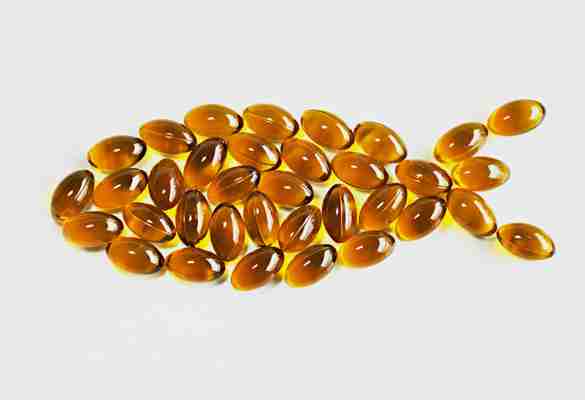Fish Oil during Pregnancy: Benefits, Risks & Precautions to Consider
Last Updated on October 27, 2020

There are many benefits of consuming fish oil as a supplement. It contains Omega-3 fatty acids which have been found to be highly beneficial when fighting heart disease. But is fish oil good for you when you are pregnant?
Is Fish Oil Safe During Pregnancy?
The short answer is that yes, fish oil is safe during pregnancy. Not only is it safe, but it is also beneficial to you and your baby. Fish oil is usually consumed in the form of either supplements or directly by eating a fish-rich diet. The supplements are also enriched with Vitamin E to make it last longer. Research has indicated that mothers who take fish oil supplements have children with better brain development.
Benefits of Fish Oil for Pregnant Women
There are many reasons why you must incorporate fish into your diet or take fish oil supplements rich in Omega-3 fatty acids during pregnancy. These include:
Immunity: When pregnant women take fish oil supplements, the child is usually observed to have a more robust immune system.
When pregnant women take fish oil supplements, the child is usually observed to have a more robust immune system. Mood: It has been observed that children whose mothers had taken fish oil supplements during pregnancy are generally more stable and are not prone to mood swings or tantrums.
It has been observed that children whose mothers had taken fish oil supplements during pregnancy are generally more stable and are not prone to mood swings or tantrums. Nutrition: Fish oil supplements are a well-known source of nutrients like Omega-3 fatty acids, Vitamin A and D.
Consult your doctor if you have any further doubts regarding the consumption of these supplements. While it is true that not all women take this supplement, new research is bringing out the benefits of Omega-3 fatty acids, especially for pregnant women.
Ideal Dosage for Pregnant Women
If you are already consuming fish on a regular basis, then there is no need for supplements. Just make sure that you are having between two to three servings of fish every week. If you do not have access to fish during your pregnancy, then the daily recommended dosage will be around 300mg per day. You can get this taking fish oil supplements.
Risks of Consuming Fish Oil in Pregnancy
Some of the risks of consuming fish oil during pregnancy are:
Too much fish oil will affect your body’s ability to clot blood. If you are getting your recommended levels of fish oil from fresh water, then you must make sure of the source. Many types of freshwater fish have high mercury levels which could affect the health of the baby. Fish that you must avoid are shark, swordfish, and tilefish. Check to see where the supplement is extracted from. If it is extracted from the liver of the fish, then avoid the supplement as it contains Vitamin A which can be harmful to the baby.
Foods Containing Omega-3
The most obvious choice for Omega-3 fatty acids comes from cold-water fish. These include salmon, anchovies, tuna, and sardines. However, with the awareness of mercury poisoning and the increase in pollution levels of the oceans, most people will recommend that you take fish oil through supplements. Make sure that this is extracted from the body of the fish and not from the liver of the fish.
It is commonly believed that flax seeds, chia seeds, walnuts and so on, also contain Omega-3s. However, fish oil has the most beneficial form of Omega-3s.
Fish Oil Supplements
Fish oil supplements are one of the best ways to get Omega-3s into your body. They are perfectly safe and are recommended by most doctors as most of us do not have access to a fresh supply of seafood.
There are two varieties of fish oil available in the market today. You must take the one known as Omega-3 supplements as they are made from the body of the fish and are completely safe to be consumed during pregnancy.
Fish oil supplements made from the liver of the fish such as cod liver oil should be avoided during pregnancy. They contain Vitamin A and can be harmful to your baby.
Buying Tips
When buying Omega-3 supplements, it will do you some good to investigate a bit further into the brand apart from just reading the label. Learn how the brand extracts the oil and if the manufacturing process meets that of international levels.
You should also check for the smell. While you might think that fish oil must smell like fish, it will only do so once the oil is turning rancid. If the supplement smells fishy or rancid, then it is well past its expiration date and you must avoid it.
The taste of the supplements should also be neutral. It should not have any strong taste whether that of a fish or otherwise.
Precautions and Safety Concerns
While you might be tempted to go out and buy a pack of Omega-3 supplements, you must take the following precautions:
It is imperative that you talk to your doctor regarding the dosage of fish oil that you will require during pregnancy. In fact, your doctor will be able to prescribe the brand of the supplement along with the dosage. This way, your doctor will also stay updated on your nutrition. It is important that you check if you have any allergies to fish oil before you consume any supplement. You can get a simple allergy test done if you are not sure. This is especially true for vegetarians who have never consumed fish before and do not know. In case of an allergic reaction to the supplement, you must seek immediate medical advice. You must always remember to stick to the prescribed dosage. Just because the supplement is good for you, doesn’t mean that it won’t be harmful if taken in excessive amounts. Buy only reliable brands. It is best that you try to get the brand recommended to you by your doctor. You must also read up on the ingredients and check the mercury levels in the oil. High mercury levels can be harmful to the development of the baby.
Fish oil has many benefits that are derived from long-chain Omega-3 fatty acids. When you are pregnant, this nutrient is also beneficial to the development and health of your baby.
Also Read: Benefits & Risks of Eating Walnuts in Pregnancy
Fish Oil for Hair: How to Use, Benefits, Side Effects, and Precautions
Fish oil is a commonly consumed dietary supplement rich in omega-3 fatty acids and other essential nutrients. It’s believed to promote overall health. Proponents of natural medicine use fish oil to treat a range of symptoms, from mental health conditions to chronic diseases . Since the omega-3s in fish oil are believed to help to regulate the body’s natural functions, advocates of fish oil suggest that it may also: trigger hair growth

promote hair strength
nourish hair follicles Keep reading to learn more about the potential benefits of fish oil for hair, and how to use.
Omega-3 benefits for hair Many people consume fish or fish oil supplements to promote hair growth and prevent hair loss, suggesting that the omega-3 found in fish oil: provides essential proteins and nutrients to hair follicles and skin
prevents hair follicle inflammation — a factor that can directly contribute to hair loss
promotes circulation in the scalp that may trigger hair growth Although there’s currently not a sufficient amount of clinical research to fully support these claims, there has been positive research, including: A 2015 study indicated that women taking a fish oil supplement experienced significantly increased hair growth and reduced hair loss.
indicated that women taking a fish oil supplement experienced significantly increased hair growth and reduced hair loss. A 2018 study indicated that when mackerel-derived fermented fish oil (FFO) extract was topically applied to mice it significantly stimulated hair growth.
indicated that when mackerel-derived fermented fish oil (FFO) extract was topically applied to mice it significantly stimulated hair growth. A 2015 study indicated that women experienced reduced hair loss and increased hair density when taking a supplement of antioxidants along with omega-3 and omega-6 fatty acids. Fish oil advocates anecdotally suggest topical application of fish oil may help add luster and shine to your hair as well as making it healthier. If you decide to apply fish oil directly to your scalp, be aware that fish oil may have an odor considered unpleasant to you or others.
How do you use fish oil for hair growth? One of the simpler methods of adding fish oil into your routine is to include more fatty fish in your diet, including: salmon
mackerel
herring A common, odorless way to incorporate fish oil in your health regimen is to take dietary supplements. Use only as directed and be sure to consult your physician before introducing a new vitamin or supplement into your daily regimen.
How much fish oil should you take? Your doctor will advise you on a suitable amount of fish oil for your current health situation. They’ll take into account any medications and other supplements you may be taking. According to the European Food Safety Authority , up to 5,000 mg of an omega-3 fatty acid supplement can be safely consumed daily.
Precautions Fish oil supplements are generally considered to be safe. Side effects of omega-3 supplements are usually mild and include: bad breath
fishy aftertaste
nausea
headache
indigestion
diarrhea
rash According to the Mayo Clinic, fish oil supplements may also interact negatively with other drugs, such as: blood pressure medication
anticoagulants
contraceptives Talk with your healthcare provider before taking fish oil alongside your daily medications.
Fish Oil: Benefits, Precautions, Supplement and Dosage
Fish oil is one of the commonly utilized dietary additions. It’s plentiful in omega-3 fatty acids, which are extremely important for your well-being. If you don’t consume much oily fish, practicing a supplement could assist you in obtaining enough omega-3 fatty acids.

Fish Oil Overview
Fish oil is the fat or oil that’s derived from fish muscle. It usually occurs from oily fish, such as herring, tuna, anchovies, and mackerel. Yet it’s seldom originated from the livers of another fish, as is the problem with cod liver oil.
The World Health Organization (WHO) proposes eating 1–2 fish per week because the omega-3 fatty acids in fish give many health advantages, including strength against various diseases. But, if you don’t try 1–2 servings of fish per week, fish oil capsules can assist you in preparing enough omega-3s fish oil.
What are the benefits of taking fish oil?
1. Heart care
Heart disease is the first cause of death globally. Inquiries confirm that people who consume much fish have much lower rates of heart disease.
Various risk factors for heart disease seem to be overcome by the consumption of fish. The advantages of omega-3 fish oil for heart care include:
Cholesterol levels: It can raise levels of “good” HDL cholesterol .
Blood pressure: Even in small doses, it assists decrease blood pressure in people with high levels.
Plaque: It may limit the plaques that produce your arteries to develop and cause arterial plaques more well-built and more reliable.
Although fish oil capsules can develop many of the risk parts for heart disease, there is no obvious indication to prevent heart attacks.
Buy Cholesterol Medicine
2. Treat mental disorders
Supplements can limit the origin or increase the symptoms of some mental disorders. For example, it can decrease psychotic disorders in those at risk. In addition, high dosages may decrease some symptoms of schizophrenia and bipolar disorder.
3. Help to weight loss
Obesity can significantly boost your chance of other diseases, including heart disease, type 2 diabetes, and cancer growth. Supplements may enhance body composition and risk portions for heart disease in overweight people.
4. Eye health care
Like your brain, your eyes necessitate omega-3 fats. Data reveals that people who don’t make enough omega-3s have a higher risk of eye infections.
5. Reduce Inflammation
Inflammation is your immune system’s method of fighting infection and healing injuries. However, chronic Inflammation is linked with critical illnesses, such as obesity, diabetes, depression, and heart disease.
Reducing Inflammation can improve the symptoms of these diseases. Because it has anti-inflammatory features, it may improve to treat chronic inflammatory conditions.
6. Healthy skincare
Your skin is the biggest organ in your body, and it includes many omega-3 fatty acids. Skin health can settle throughout your life, particularly during old age or after too much sun exposure. Several skin diseases may help from fish oil additions, including dermatitis.
7. Pregnancy care
Omega-3s are necessary for new growth and development. Consequently, mothers want to get enough omega-3s during pregnancy and while breastfeeding. Supplements in pregnant and breastfeeding mothers may develop hand-eye coordination in newborns.
Using fish oil supplements during pregnancy and breastfeeding may further enhance infant visual development and reduce the risk of allergies.
8. Reduce liver extra fat
Your liver manages most of the fat in your body and can play a role in weight gain. Liver disease is often shared, in which fat stores in your liver.
Fish oil additions can enhance liver function and swelling, which may help decrease symptoms and oil in your liver.
9. Improve signs of depression
Depression is supposed to become the second-largest origin of illness by 2030. Interestingly, people with significant depression seem to have lower blood levels of omega-3s.
10. Improve hyperactivity in children
Given that omega-3s make up a meaningful proportion of the brain, producing enough of them may be required to limit behavioral disorders in early life.
Supplements may increase observed hyperactivity, inattention, impulsiveness, and aggression in children. This may serve early life people.
How to Supplement
If you cannot eat 1–2 pieces of oily fish per week, you may require to consider practicing a supplement.
Dosage
Dosage recommendations differ depending on your age and health. Still, it may be required to increase the dosage if you are pregnant, nursing, or at risk of heart disease.
Precautions
Bipolar disorder: Practicing fish oil might develop some of the symptoms of this disease.
Liver disease: It might raise the risk of bleeding in people with liver scarring due to liver disease.
Depression : Taking might improve some of the signs of this disease.
Diabetes : There is some interest in using high doses of fish oil to make blood sugar control more difficult.
High blood pressure : It can lower blood pressure and provide blood pressure to fall too low in people with blood-pressure-lowering medicines.
Buy Supplements Online
What is fish oil bad for?
When taken as recommended, fish oil supplements are generally considered safe.
However, mild fish oil side-effects side including:
A fishy aftertaste
Bad breath
Heartburn, nausea, or diarrhea
Rash
Fish oil uses (high dosages) supplements might increase the risk of bleeding and possibly increase the risk of stroke.

